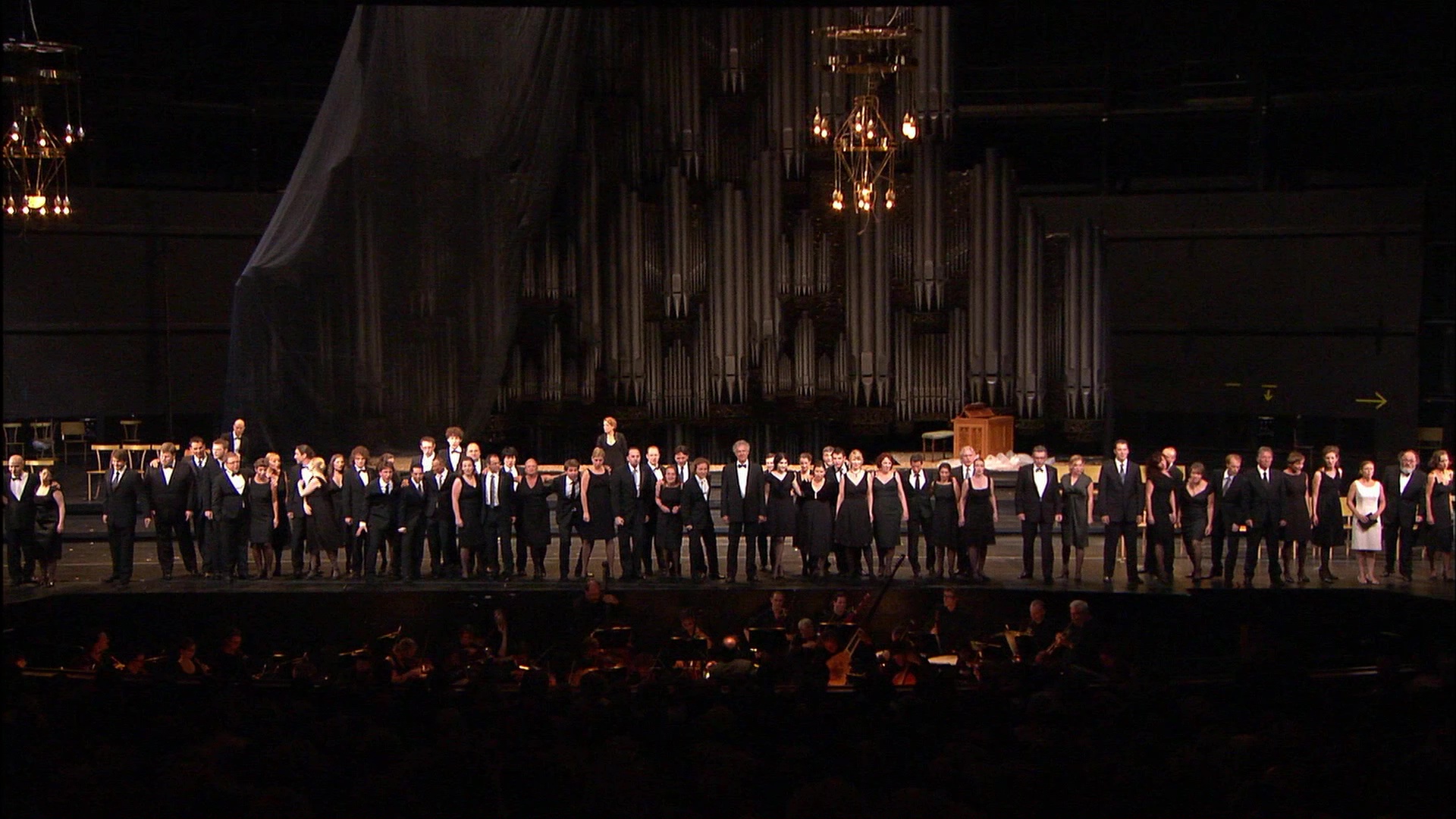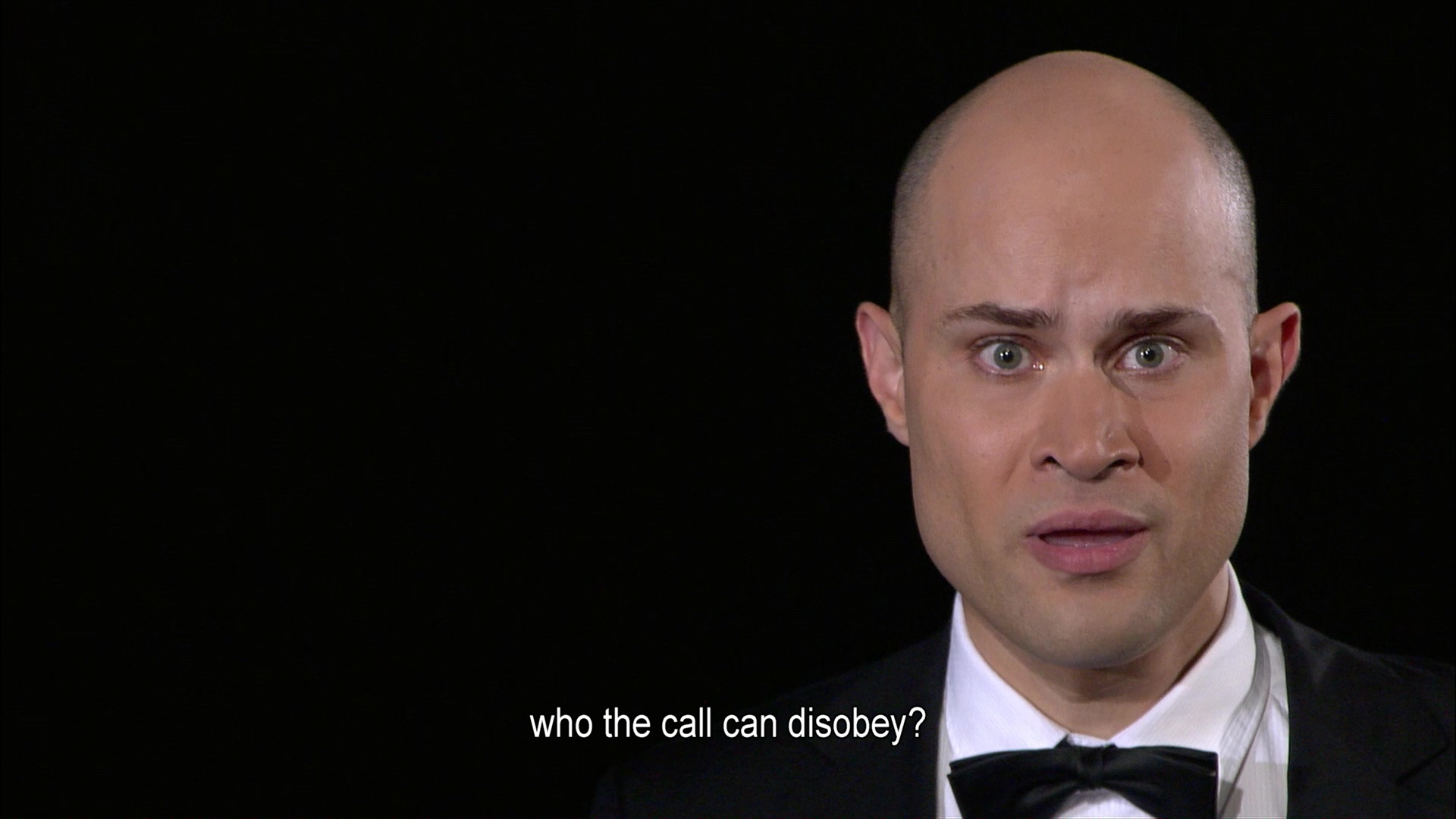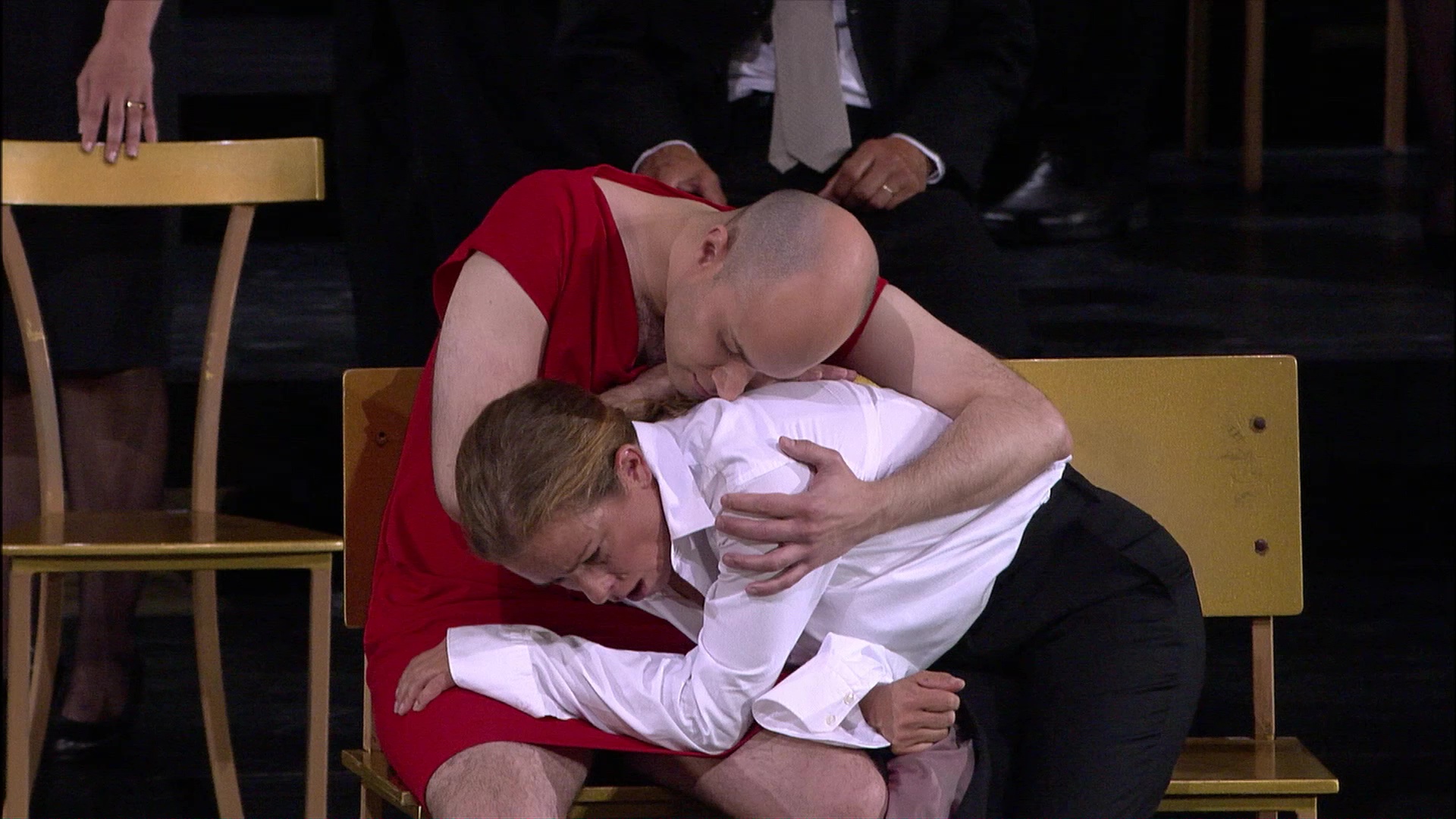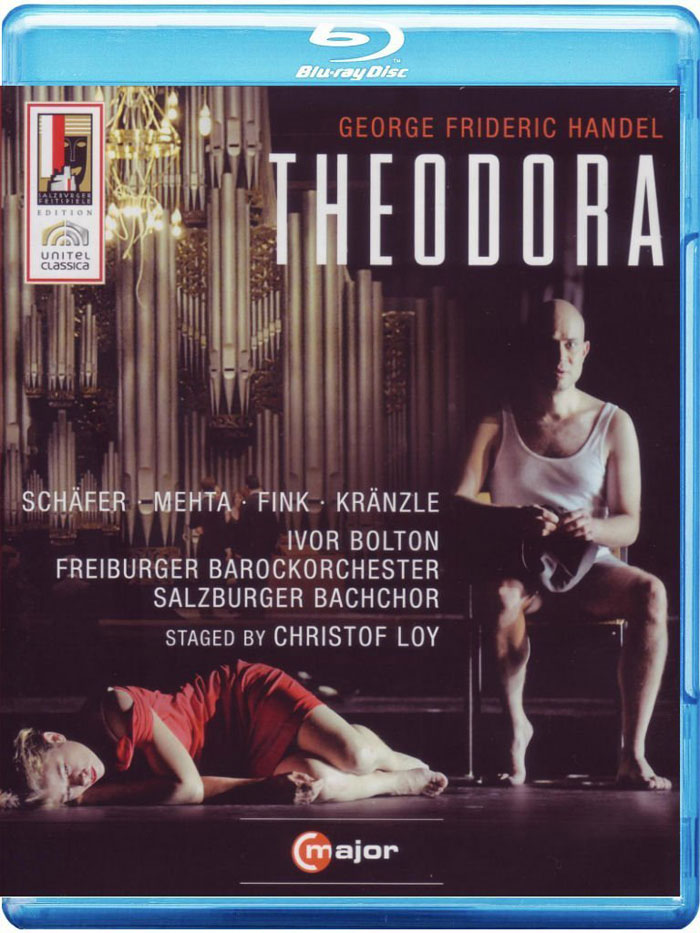
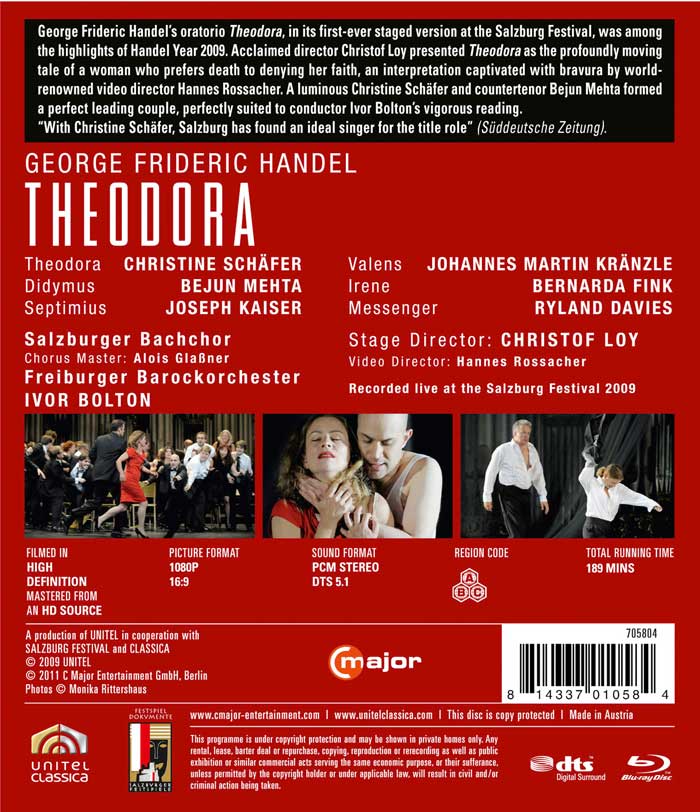
Handel Theodora oratorio to libretto by Thomas Morell. Directed 2009 by Christof Loy at the Salzburg Festival. Stars Christine Schäfer (Theodora), Bejun Mehta (Didymus), Joseph Kaiser (Septimius), Johannes Martin Kränzle (Valens), Bernarda Fink (Irene), and Ryland Davies (Messenger). Ivor Bolton conducts the Freiburger Barockorchester and the Salzburger Bachchor (Chorus Master Alois Glaßner). Organ solo by James McVinnie. Set design by Annette Kurz; costume design by Ursula Renzenbrink; lighting design by Stefan Bolliger; dramatic advice by Thomas Jonigk; choreographic assistance by Thomas Wilhelm. Directed for TV by Hannes Rossacher. Sung in English. Released 2011, disc has 5.1 dts-HD Master Audio sound. Grade: B
Handel wrote Theodora as an oratorio that would normally be formed by a large chorus standing in rows with the soloists in front and all singers using sheet music. Opera director Christof Loy was hired to semi-stage the oratorio. Loy was a good choice for this since his style as opera director generally is to vastly simplify sets, props, and dramaturgy to the point that even operas become semi-staged. With Loy on board you can save money on the frills and pay bigger fees to get the best singers.
But for all the singers, semi-staging Theodora was hugely different than a typical oratorio concert because everybody had to learn their scores by heart! And everybody also had to act, and act a lot since there are no elaborate sets, props, and costumes to help keep the attention of the audience. Now when a singer signs on to be a member of the chorus at an opera house, he knows he will be asked to do all kinds of bizarre things. But I suspect this Handel Theodora was a real challenge to the members of the Salzburger Bachchor!
Handel also wrote the Organ Concerto in G Minor for performance with Theodora. As best we can tell, the organ piece was usually performed as a bonus extra, perhaps at an intermission. But Loy incorporates the concerto into his Act 3, where it seems to fit in nicely. One is reminded of Beethoven’s Leonore music embedded in Act 2 of his opera Fidelio.
In our first screenshot below we see Theodora (Christine Schäfer), a Christian woman from a leading family in Antioch, being arrogantly pestered by Valens (Johannes Martin Kränzle), the Roman “President” of Antioch. The emperor in Rome has issued a decree that all Roman subjects must make an offering at the temples of Venus and Flora. Valens knows or suspects that Theodora is a Christian and he will enjoy watching her discomfort as she obeys the order. If she disobeys, the penalty is death:
In the next 2 screenshots below, we see the “Loy line-up.” Every body wears black and white and lines up across the front of the stage:
The only variation in the Loy Line-up is that sometimes everybody has a chair:
Back to our story. Didymus (Bejun Mehta) is a respected Roman army officer who has secretly converted to Christianity and is in love with Theodora. He has standing to make suggestions to the President. Here he argues that it is counter-productive to force friends of Caesar to violate their religion:
But Theodora, a paragon of virtue whose name means “lover of God”, already senses that she must make a fatal choice:
Septimius (Joseph Kaiser ) is another Roman officer and battle-tested friend of Didymus. Septimius is a loyal Roman, but he feels compassion for the conquered people of Antioch. Instead of forcing them to worship the Roman gods, he asks that “pity” should . . .
One of the benefits of being Roman is that you get to have orgies. The orgy below makes a mess of the Loy line-up. BTW: in all these full-stage shots, you see the organ on the rear of the stage that will be used for the organ concerto:
Theodora resists. Instead of a swift death, Valens orders a worse punishment: she will be taken to the temple of Venus to come an offering herself. She will be dressed in red and serve for the rest of her life as a temple prostitute. She will start her new career by hosting Valens’ bodyguards:
This punishment of Theodora is too much for Didymus to bear—he must act. In an effort to enlist his friend Septimius as one of Theodora’s defenders, Didymus reveals that he is a secrete convert to Christianity:
Septimius is tremendously conflicted, but he continues to feel that the solution is for Theodora to relent and agree to make the offering to the Roman gods. Didymus and Theodora are on their own—and both feel called to martyrdom rather than surrender:
Didymus enters the brothel and convinces Theodora to escape by exchanging their clothing. As they undress the long-repressed love between them bursts to the surface, but even this cannot be consummated under these harrowing circumstances:
And so must Theodora and Didymus be satisfied with merely pulling a jailbreak on Valens. The President is furious, but he is clever enough to put the onus back on Didymus: all he has to do is comply and he will be forgiven by Caesar:
And Theodora turns herself in!
Each of the lovers offers to go to the place of iron and fire in exchange for the freedom of the other. Then Valens condemns them both to death:
They will die soon, but Septimius more slowly. It appears there are other versions of the story in which Septimius coverts to Christianity and goes on to his own martyrdom, etc., but Handel was content with the deaths of two Christians and two lovers simultaneously:
The main attraction here is the music This is described by Keris Nine (don’t know if this is a real name or an avatar) in 2011 on operajournal.blogspot.com as follows in slightly edited form:
“The music is warmly rapturous, the singing heavenly, and the choruses uplifting. The producers recognize the strengths of the plot and give them center stage, doing nothing in the loose damatization that could interfere with the singing. The singing performances are magnificent, the English diction perfect in every case. Christine Schäfer’s Theodora exhibits fragility turning into steely determination, Bejun Mehda is a glorious countertenor Didymus , and Joesph Kaiser is a fine, emotionally-moved Septimius. Ivor Bolton conducts the Freiburger Barockorchester with great sensitivity.”
The weaknesses would all reside in the cheapness of the mis-en-scéne, that does in our view distract from this disc. See our story on Handel’s Messiah, staged by Claus Guth at the Theater an der Wein, which we graded A. The Guth Messiah show involves a radical story overlay, something that would not be indicated for Theodora at all, which has a robust story libretto. But Guth’s sets, props, costumes, and personal directing go far beyond what Loy attemped. So we have settled on a B grade for this Theodora. For those willing to overlook the lack of significant mis-en-scéne, the proper grade would be a B+ or even an A-. We should also point out that this is to date our only HDVD of Theodora, and that Handel himself considered it his best oratorio. So for true Handel lovers, this may be an essential addition to the library.
Here's an official trailer for Theodora:
OR

